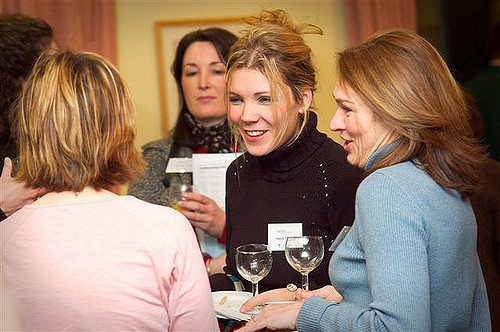Navigating the Social Scene at Professional Events

Professional events are essential parts of your working calendar. These could be dedicated to providing women in business with key networking opportunities. Alternatively, they might be brand parties held by companies you want to strengthen connections to. No matter what the focus is, it’s not enough to just show up. The real value is in the conversations you have and the relationships you build.
Nevertheless, this social aspect of professional events isn’t always quite the same as in your personal life. The business world is so nuanced that it’s not difficult to inadvertently commit a faux pas that affects the impression you leave. The good news is that a little knowledge of etiquette can help you here.
Addressing Dress Codes
Dress codes can feel a little indecipherable at times, can’t they? Yes, there are situations where what to wear is a little clearer than others. You’re familiar with what’s considered acceptable for your daily office situation and you can pretty much assume that an industry awards ceremony is black tie. But more borderline professional events, like networking nights or conferences, can be a bit more difficult.
Is what you’re wearing to these events important? Well, it can be, yes. Committing dress code faux pas can make a negative impression on potential clients, contacts, and industry peers. Perhaps most importantly, feeling you’re wearing the wrong outfit can give your self-esteem a bit of a knock.
There are some relatively simple steps you can take to coordinate your style with the professional event. Firstly, look at the event invitation. The host will usually detail what the dress code is. Business casual is usually similar to what many people wear in the office, with collared shirts or blouses and sport jackets as common choices.
Business professional is a step more formal, usually requiring a suit or a smart skirt and blouse, with dress shoes essential. No matter the dress code, ensure your outfit is clean and undamaged, even in casual situations. A few well-placed accessories, such as watches, rings, and bags, can keep things professional while adding personal flare.

Balance the Professional and Social Demeanor
When you’re spending time with colleagues or personal friends, there’s often a natural sense of what demeanor the situation requires. What you can joke about, what topics of discussion are appropriate, and even what attitude to take is clear. It can be less so when navigating the social scene at professional events. The last thing you want is to overstep that invisible line and leave a bad impression.
That said, you don’t necessarily want to come off as all business. There’s a challenging balance to achieve here so you seem both approachable and professional.
Some things that can help you achieve this balance include:
● Using a genuine smile: This might seem like a basic step, but make sure you’re using your genuine smile. In professional social situations, particularly if people feel uncomfortable or think they need to “put on a show”, it can be easy to use exaggerated expressions. This tends to come across as overly familiar, false, or — worse — obnoxious. Firstly, remember that in all likelihood everyone else there is nervous, too. Try to relax and let your inner positivity shine through.
● Keeping alcohol consumption to a minimum: Many professional events feature alcohol and drinking is often connected to being sociable. Don’t overdo it, though. Alcohol affects your body in various ways, including influencing your central nervous system (CNS). Its depressant qualities can influence your control over your emotions. Not to mention that alcohol can influence behavior, from your motor skills to your cognitive functioning. To avoid embarrassing incidents, it’s best to drink in moderation
Everyone is different. Think about specific parts of your personality that could disrupt the balance. For instance, if you’re an oversharer, you may need to be mindful of how much personal detail you divulge to strangers. Being honest with yourself about these qualities shouldn’t result in negative self-talk. Rather, it’s about using your self-knowledge to empower you to make informed decisions.

Managing Group Conversations
At professional events, it’s not necessarily going to be the case that you’ll always be talking to people one-on-one. You might find your smaller chats becoming larger group conversations or want to join one. Some actions you can take can include:
● Introduce and inquire: Greet the other participants of the group before introducing yourself and who you represent. Importantly, ask if they’re happy for you to join their conversation. This directness can actually help overcome the awkwardness of uncertainty about joining a discussion in progress.
● Contribute without overshadowing: Whether due to nervousness or quirks of personality, some people can dominate group conversations and make subjects all about themselves. Worse still is to boast or bend the truth to seem more impressive. Instead, you should be genuinely listening to what others are saying. Take the time to consider their points before contributing honest insights and opinions. This helps to demonstrate you’re a considerate, informed, and engaged participant.
You can also try to find a group that has at least one person you’re familiar with in it. This can be a great ice-breaker for joining, lead to smoother introductions to the rest of the group, and help you feel a little more comfortable.
Above all else, though, be yourself. Yes, there are some adjustments to make to navigate the nuances of professional situations. But this doesn’t mean you should sacrifice your authentic personality. Who you are is an asset to your professional life. This knowledge about social elements of professional events should support and inform your experience.
This guest post was authored by Ainsley Lawrence

Ainsley Lawrence is a freelance writer who lives in the Northwest region of the United States. She has a particular interest in covering topics related to good health, balanced life, and better living through technology. When not writing, her free time is spent reading and researching to learn more about her cultural and environmental surroundings. You can follow her on Twitter @AinsleyLawrenc3
******
Ms. Career Girl strives to provide valuable insights you can use. To see more from our columnists and guest authors, check these out! Or subscribe to our weekly email featuring our latest articles. We’re also present on Medium!

